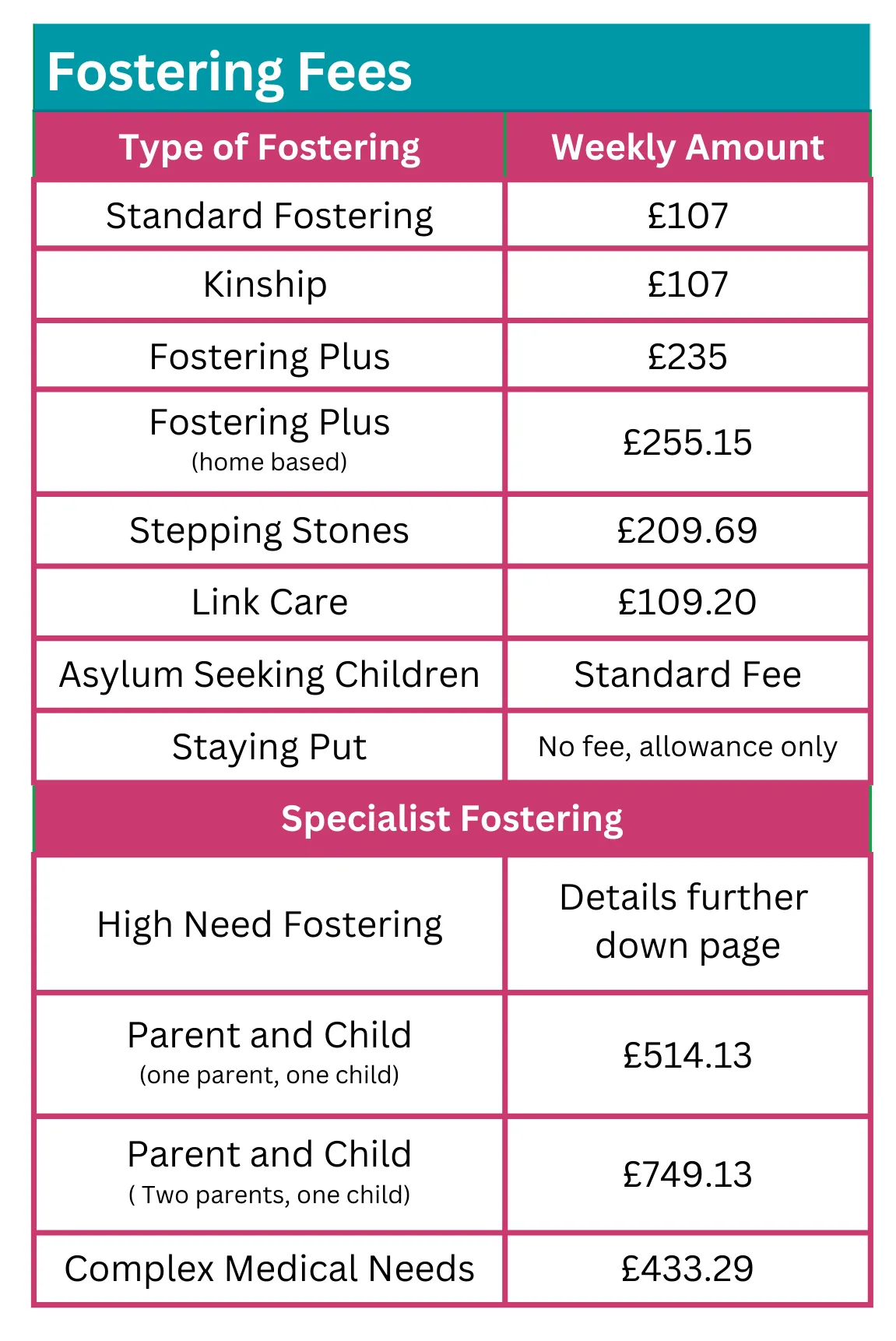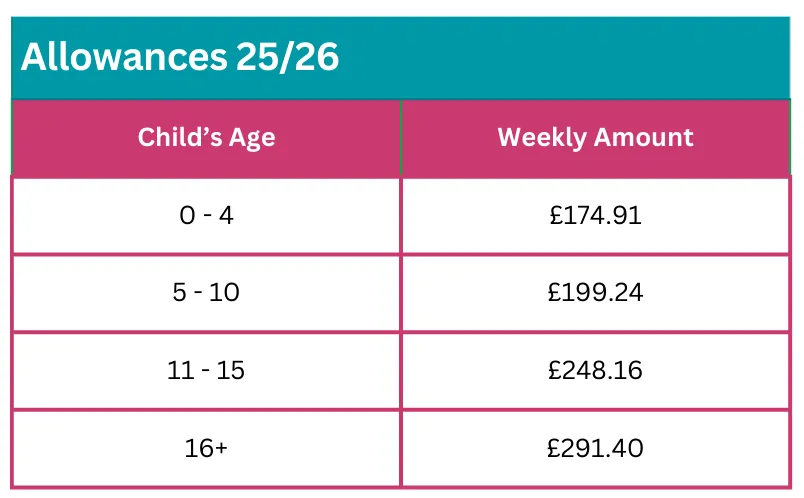Fees & allowances explained
If you're thinking about fostering, it's natural to want a clear idea of the financial support available to you alongside the emotional support. Fostering should be about making a difference to a child, but we understand that it also needs to work for your family.
Our payments are designed to help you provide a safe, stable and nurturing home, while maintaining your own financial stability, and we are always happy to talk through payments, so please don't feel worried about asking questions related to finance.
Your Weekly Fostering Payments
Foster carers receive two weekly payments. You receive both payments for every child you care for.
- A fee payment, which recognises your time, skills and commitment as a foster carer.
- An allowance payment to cover the everyday costs of caring for a child, including food, clothing, activities, pocket money, transport and household bills. The allowance varies depending on the age of the foster child.
Weekly Fee Payments
The weekly fee payment recognises the type of fostering you offer, and the skills and experience you bring.
The table below provides an overview of the weekly fees for the most common fostering types, with more detailed information available at the bottom of the page.

Weekly Allowances
Your allowance is based on the age of the child, and is there to cover everything the child needs, from meals and clothes to pocket money and trips. The table below provides a simple overview of the standard weekly amounts

Additional Payments
Foster carers also receive extra support throughout the year to help with special occasions and seasonal costs.
- Birthdays: One extra week of the child’s allowance
- Christmas: One extra week of the child’s allowance
- Summer Holidays: Two extra weeks of allowance (paid in instalments or as a lump sum)
- Mileage or public transport costs can be claimed when you go to meetings, contact with birth parents, school and medical appointments, plus clubs and activities for the child. Mileage is claimed at 45p per mile for use of your own vehicle.
- School Uniform: £100 payment when a child starts primary school, £150 for starting secondary school. If a child is received into care with inadequate uniform these additional payments may also apply. It is an expectation that a child moving from one foster home to another will take appropriate uniform with them.
- Emergency Placement Availability: Carers may choose to be available on the Emergency Duty Team vacancy list and will receive a £50 payment if a child is placed with them.
- Day Care Support: Payments are made to carers who provide short‑term care for all or part of a day, usually so the child’s main foster can attend appointments, training, or family commitments. or example a carer providing full day care for a child aged 15 would receive a payment of £50.73 (based on a standard fee). Payments are higher for children with complex needs.
- Training and mentoring support: Foster carers who support with activities such as training and mentoring to support the service also receive a payment of £50.73 for a full day of their time.
*New carers also receive a one-off welcome payment of £200 after completing assessment and training*
You may also find the FAQ's section of the website, this blog post, and the 'Fees & Allowances Booklet' on the policies page helpful.
Discounts and Rewards
Foster carers also benefit from a range of local and national discounts on days out, shopping, holidays and more.
Carers providing at least 182 overnight stays for a child within the previous 12 months (further terms apply - click here for details) are also eligible for a 50% discount on their Council Tax.
Examples
Mainstream Fostering
Mr Smith fosters 9‑year‑old Theo and his 15‑year‑old sister, Anna. He receives £447.40 per week in allowances, and £214 per week in fees, making a total of £661.40 per week. He also receives additional payments for birthdays, Christmas, school holidays and mileage.
Parent & Child Fostering
Mr Smith supports an 8 month old child and their single parent. He receives:
Weekly fee: £514.13
Weekly allowance paid to foster carer to cover the cost of caring for the child: £174.91
Weekly allowance (at the 16+ rate) paid to foster carer to cover costs of parent (food etc...): £291.40
Total: £980.44 per week
If both parents and the child were living with Mr Smith, he would receive all the above payments, plus an additional weekly allowance payment of £291.40, and additional weekly fee of £235 for the second parent.
Total: £1506.84 per week
High Need Fostering
High Need foster carers receive around £45,000 per year in fees and allowances. You can find out more about this specialist type of foster care here.
Want to talk it through?
If you would like to understand more about payments, the different types of fostering available, or how fostering could fit into your life, our friendly team is here to help.
Email fosteringteam@somerset.gov.uk
Specialist Fostering (and other schemes)
Several types of fostering come with a higher weekly fee as standard, to reflect the type of foster placement and care a foster carer provides.
Fostering Plus
While we do not currently offer a specific “Fostering Plus” scheme, payments are matched to the needs of the child and we will consider additional payments on an individual basis where circumstances require it.
For this type of fostering, carer receive £235 fee per child
If there is a requirement for the carer to be home-based, the fee increases to £255.15 per week, per child.
Step Forward
This type of care supports children stepping out from residential arrangements.
The weekly fee for this type of fostering is £614.25 per week on a temporary basis, plus the relevant age-related allowance for the child in care.
High Need
High Need foster carers receive around £45,000 per year in fees and allowances. You can find out more about this specialist type of foster care here. High Need is part of the Homes and Horizons strategic partnership between Somerset Council and Homes2Inspire, operating as an independent fostering agency with separate policies and payments.
Parent and Child Fostering (also known as Family Assessment and Support Team FA&ST)
Parent and child foster carers receive a weekly fee of £514.13, plus and additional weekly fee of £235 if second parent in placement, plus the relevant allowance for the child and parent(s) in their care. You can find out more about this specialist type of foster care here.
Short Break Care
Short Break carers care for children with a range of disabilities. Most Short Break carers will meet the requirements of Fostering Plus through the skills and experience that they have for this specific fostering task. Short Break carers are paid a proportionate allowance and fee on the days they foster children. Those carers who care for children who are Continuing Healthcare (CHC) funded (that is those with complex medical needs) will then receive the £433.29 pro rata.
More details on Short Break Care can be found here.
Children who attend Residential Education Provision
Carers receive the fostering allowance when the child stays, and a retainer of 50% of the allowance and fee for maintaining contact when they are not there. Find out more about this type of care here.
Complex Medical Needs
If you are caring for a child full-time who has complex medical needs, this type of fostering has a weekly fee of £433.29.
Linked Foster Carer
Carers work alongside a residential home to support a child in long-term residential care, building long-term relationships to support the child and experience family life outside of their residential setting. Carers receive the relevant fostering allowance and fee (according to their own approval level) for the days that they care for the child. This will be calculated on a pro rata basis and calculated per day/half day rate. Carers will also receive a fostering retainer of £109.20 per week.
Stepping Stones
Supported lodgings providing a bedroom and guidance to young care leavers as they learn to live independently.
Carers on this scheme receive a weekly payment of £224.77 per week, plus a little extra toward food and utilities etc (up to £30.04) paid weekly by the young person from their personal allowance (depending on the Placement Planning).
More information on Stepping Stones can be found here.
Staying Put
This relates to young people who remain with their current foster carers post 18, under the Staying Put Arrangements. Foster carers do not receive a fee, but are paid the 16+ allowance £291.40 less the current rate of Universal Credit.
Kinship Foster Carers
Kinship foster carers who look after a child related or known to them will usually receive the standard fostering fees, as detailed above. Details about Kinship and Connected Persons can be found here.
Single Placement Scheme
If you are a carer able to provide a home for more than one child, but are caring for a child full-time who cannot be placed alongside other children, you will receive a weekly fee of £433.29 to reflect the type of placement offered.





